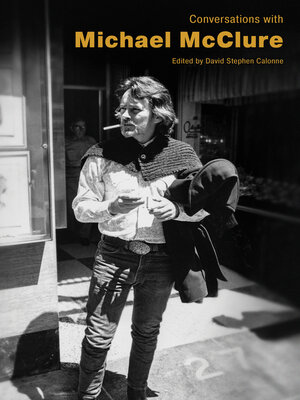
Sign up to save your library
With an OverDrive account, you can save your favorite libraries for at-a-glance information about availability. Find out more about OverDrive accounts.
Find this title in Libby, the library reading app by OverDrive.



Search for a digital library with this title
Title found at these libraries:
| Library Name | Distance |
|---|---|
| Loading... |
Conversations with Michael McClure features twenty interviews from 1969 to 2015 that chronicle the capacious scope of McClure's creativity. McClure (1932–2020) is notable not only for his considerable achievements as a poet and prose writer of the Beat Generation, but also for the many collaborative connections he forged over seven decades. From the 1950s to his death, McClure worked with an astonishing range of important figures in the worlds of painting, filmmaking, music, and science. McClure counted among his friends and acquaintances Bruce Conner, Harold Pinter, Amiri Baraka, Richard Brautigan, Wallace Berman, George Herms, Lawrence Jordan, Dennis Hopper, Bob Dylan, Janis Joplin, Jim Morrison, Ray Manzarek, Sterling Bunnell, Francis Crick, Gary Snyder, Francesco Clemente, and Diane di Prima.
During his early years in San Francisco, McClure attended Kenneth Rexroth's literary evenings and formed significant lifelong friendships. Among those friends were poets Philip Lamantia and Robert Duncan, who became a mentor to McClure. He also learned much from Charles Olson and adopted several features of Olson's concept of "Projective Verse" in his own work. McClure's exchange of letters with experimental filmmaker Stan Brakhage lasted for four decades. During his illustrious career, McClure published fourteen books of poetry, eight books of plays, and four collections of essays. Conversations with Michael McClure reveals the many contributions of this central personality in the evolution of the American counterculture.
During his early years in San Francisco, McClure attended Kenneth Rexroth's literary evenings and formed significant lifelong friendships. Among those friends were poets Philip Lamantia and Robert Duncan, who became a mentor to McClure. He also learned much from Charles Olson and adopted several features of Olson's concept of "Projective Verse" in his own work. McClure's exchange of letters with experimental filmmaker Stan Brakhage lasted for four decades. During his illustrious career, McClure published fourteen books of poetry, eight books of plays, and four collections of essays. Conversations with Michael McClure reveals the many contributions of this central personality in the evolution of the American counterculture.







